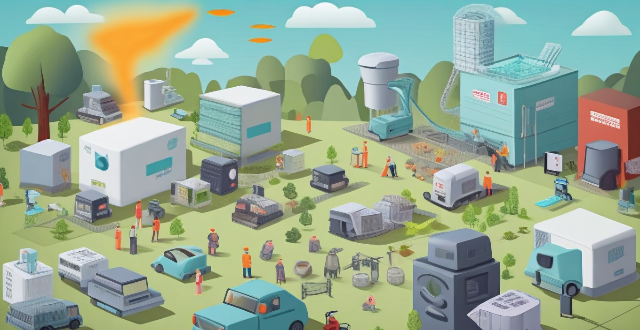Proper waste management is crucial for conserving energy and reducing pollution. It involves strategies like composting organic waste to reduce methane emissions, enhancing recycling to save energy in manufacturing new products, preventing environmental pollution through proper disposal, promoting sustainable practices like reduce, reuse, and recycle, and supporting the circular economy model. By adopting these measures, we can move towards a more sustainable future that conserves resources and protects our planet.

Proper Waste Management: A Key to Energy Conservation and Pollution Reduction
Proper waste management is crucial not only for maintaining a clean and healthy environment but also for conserving energy and reducing pollution. In this answer, we will explore how effective waste management strategies can contribute to these goals.
1. Reducing Landfill Space and Methane Emissions
- Landfills are a common method of waste disposal, where garbage is buried and left to decompose. However, as organic materials break down, they release methane, a potent greenhouse gas that contributes to global warming.
- Composting organic waste instead of sending it to landfills reduces the amount of methane produced. This process turns waste into a useful soil amendment, conserving landfill space and reducing harmful emissions.
2. Enhancing Recycling and Energy Recovery
- Recycling materials like paper, plastic, metal, and glass saves energy by reducing the need to extract new raw materials and manufacture products from scratch. For instance, recycling aluminum cans uses only 5% of the energy required to produce aluminum from bauxite ore.
- Energy recovery through waste-to-energy facilities converts non-recyclable waste into electricity or heat. This not only disposes of the waste but also generates power, reducing the demand for fossil fuels.
3. Minimizing Environmental Pollution
- Improper waste disposal often leads to pollution of water bodies and soil, harming ecosystems and human health. By managing waste effectively, we can prevent contaminants from entering the environment.
- Hazardous waste, such as batteries and chemicals, requires special handling to prevent toxic substances from leaking into the environment. Proper management ensures these materials are safely contained or neutralized.
4. Promoting Sustainable Practices
- Reduce: The first step in effective waste management is to reduce the amount of waste generated in the first place. This can be achieved through practices like using reusable bags, bottles, and containers.
- Reuse: Before disposing of items, consider if they can be reused for another purpose. This extends the lifespan of products and saves resources.
- Recycle: As mentioned earlier, recycling conserves energy and reduces pollution compared to manufacturing new products.
5. Supporting Circular Economy
- Circular economy is an economic model that aims to keep resources in use for as long as possible by recycling and regenerating products. Proper waste management plays a vital role in achieving this goal by ensuring materials are recovered and reused.
- By adopting circular principles, industries can create closed-loop systems where waste becomes an input for new products, significantly reducing energy consumption and pollution associated with traditional linear economic models (take-make-dispose).
In conclusion, proper waste management is instrumental in saving energy and reducing pollution by minimizing landfill usage, enhancing recycling efforts, preventing environmental contamination, promoting sustainable practices, and supporting the transition to a circular economy. By embracing effective waste management strategies, we can move towards a more sustainable future that conserves resources and protects our planet.